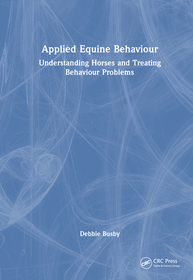
Equine Behaviour in Practice
Understanding Horses and Treating Behaviour Problems
- Publisher's listprice GBP 155.00
-
74 051 Ft (70 525 Ft + 5% VAT)
The price is estimated because at the time of ordering we do not know what conversion rates will apply to HUF / product currency when the book arrives. In case HUF is weaker, the price increases slightly, in case HUF is stronger, the price goes lower slightly.
- Discount 20% (cc. 14 810 Ft off)
- Discounted price 59 241 Ft (56 420 Ft + 5% VAT)
Subcribe now and take benefit of a favourable price.
Subscribe
74 051 Ft

Availability
Estimated delivery time: In stock at the publisher, but not at Prospero's office. Delivery time approx. 3-5 weeks.
Not in stock at Prospero.
Why don't you give exact delivery time?
Delivery time is estimated on our previous experiences. We give estimations only, because we order from outside Hungary, and the delivery time mainly depends on how quickly the publisher supplies the book. Faster or slower deliveries both happen, but we do our best to supply as quickly as possible.
Product details:
- Edition number 1
- Publisher CRC Press
- Date of Publication 11 March 2025
- ISBN 9781032947150
- Binding Hardback
- No. of pages256 pages
- Size 254x178 mm
- Weight 630 g
- Language English
- Illustrations 38 Illustrations, color; 36 Halftones, color; 2 Line drawings, color; 23 Tables, color 644
Categories
Short description:
Combining an in-depth exploration of equine behaviour with clinical practice, Equine Behaviour in Practice focuses considers how and why horses sometimes struggle to cope and provides a comprehensive explanation of how to consult on and treat a range of equine behaviour problems.
MoreLong description:
Combining an in-depth exploration of equine behaviour with clinical practice from a new progressive perspective, Equine Behaviour in Practice: Understanding Horses and Treating Behaviour Problems focuses not just on the horse’s behaviour but also on the behaviour of the human interacting with the horse. Acclaimed Clinical Equine Behaviourist Debbie Busby delivers evidence-based knowledge that will equip readers with the understanding and skills to become effective equine behaviour consultants.
Supported by considered discussion of how and why horses sometimes struggle to cope, the book comprehensively explains how to consult on and treat a range of equine behaviour problems. Rather than providing a formulaic "here’s the problem; here’s how to fix it", Busby encourages readers to develop a critical biopsychosocial evaluation based on an understanding of how horses evolved, their ethological and physiological adaptations, how they learn, and how their welfare and wellbeing can be assessed.
KEY FEATURES:
- Part 1 explains theories of equine evolution and the thin veneer of domestication
- Part 2 describes psychological and physiological theories of how horses learn, and how this can be applied in training and behaviour modification
- Part 3 illustrates this with reference to relevant legislation and widely used animal welfare models, as well as assessments of abnormal and stereotypic behaviour and practical aspects of measuring welfare
- Part 4 turns to the theory and practice of behaviour consulting, in three chapters divided into elements of behavioural assessment and treatment planning
- Part 5 examines the use of psychopharmaceuticals in behaviour therapy, discussing the roles of the behaviour consultant and the referring veterinary surgeon
Bridging the gap between science and practice, this book is a must-read for equine behaviour and veterinary students, equine behaviour consultants and practitioners, horse trainers, interested leisure riders and competition riders. It will empower equine professionals to combine behavioural and welfare knowledge with counselling and coaching skills to support horse owners in a mutual flourishing, enriching the lives of both species.
MoreTable of Contents:
PART 1: Who is The Horse? From Evolution to Domestication 2. Equine Ethology 3. Equine Senses and Communication PART 2 How Horses Learn 4. Fundamentals of learning theory 5. Further learning theory 6. Physiology of behaviour PART 3 Equine Welfare 7. Welfare and Wellbeing PART 4 Behaviour Consulting 8. Diagnosing behaviour problems - how to assess a behaviour problem and identify its likely causes 9. Treatment planning - safety and situation 10. Treatment planning - behaviour modification 11. Communication skills and behaviour consulting PART 5 Psychopharmacology Awareness 12. A behaviourist's guide to psychopharmacology. Appendices
More




